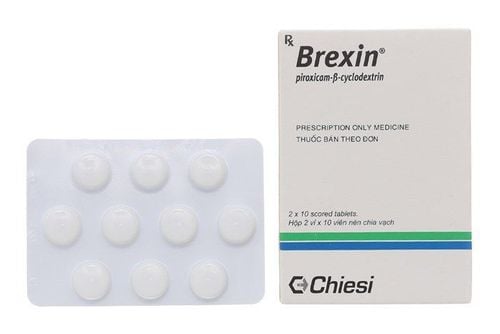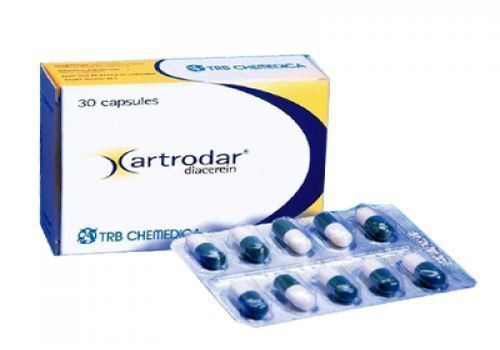This is an automatically translated article.
Vifaren is a prescription drug belonging to the group of non-steroidal anti-inflammatory drugs. The drug is made in the form of film-coated tablets containing the active ingredient Diclofenac. Vifaren is effective in pain relief, anti-inflammatory inflammatory diseases in many specialties: musculoskeletal, surgery, gynecology... So how should Vifaren be used?
1. What are the effects of Vifaren?
Vifaren drug has the main active ingredient is Diclofenac in the form of Diclofenac Sodium, prepared in the form of round tablets, yellow-brown film-coated, enteric-coated. Diclofenac has potent non-steroidal anti-inflammatory, analgesic, anti-inflammatory and antipyretic properties. Vifaren is suitable for the treatment of acute, moderate to severe pain and inflammation. At present, the exact mechanism of action of diclofenac is unknown, it is a strong inhibitor of COX 1 and COX 2 activity, reducing the formation of prostaglandins, thromboxane mediators of the inflammatory process. After oral administration, Vifaren is rapidly and completely absorbed. The percentage of diclofenac bound to blood proteins is 99.7%, mainly bound to albumin. 50% of diclofenac is metabolized in the liver for the first time, the elimination half-life is 3 to 6 hours. Approximately 60% of the dose is excreted by the kidneys in the urine, the remainder in the bile in feces.
2. Indications and contraindications of Vifaren
2.1. Indications Vifaren is indicated in:
Acute and chronic inflammatory arthritis such as osteoarthritis, acute gout attacks, cervical spine arthritis, ankylosing spondylitis, juvenile polyarthritis. Treatment of acute exacerbation of periarthritis including bursitis, tendonitis, back pain, acute shoulder pain... Post-orthopedic, trauma or surgical pain, sprains, dental... Article Treatment of dysmenorrhea, acute inflammatory pain conditions in obstetrics and gynecology. 2.2. Contraindications Do not use Vifaren in the following cases:
Patients with a history of allergy to diclofenac, other excipients. The patient is having bleeding, ulceration, gastric perforation, and progressive bowel obstruction. Patients with a history of gastrointestinal perforation, bleeding due to taking non-steroidal anti-inflammatory drugs. Patients with severe impairment of liver, kidney and heart functions. Patients after coronary artery bypass surgery. Patients with a history of asthma, angioedema, acute rhinitis, urticaria due to diclofenac, other non-steroidal anti-inflammatory drugs.
3. Dosage and how to use Vifaren
How to use: Vifaren drug is taken orally. To avoid irritation of the gastric mucosa, the patient should take the drug with or after a meal with a full glass of water. Swallow Vifaren tablets whole, do not chew.
Dosage: Depending on the clinical situation and specific diseases, the dose of the drug may change. Please follow the doctor's orders, or the patient can refer to the following recommended dose:
Ankylosing spondylitis: Take 100mg a day, divided into 2 times morning and evening. Osteoarthritis: Take 100 to 150mg daily, divided 2-3 times, 500mg each time. Long-term dose: 100mg total daily dose, if the pain is severe at night, change to drink at night before the patient goes to bed.
Rheumatoid arthritis: Oral dose of 150mg divided into 3 times, each time 50mg. For long-term use: 100mg/day is recommended.
Dysmenorrhea: Dosage may be increased to 200 mg/day.
4. Undesirable effects when taking Vifaren
Side effects when taking Vifaren include:
Common: nervous system (headache, dizziness), digestive system disorders including nausea, diarrhea, dyspepsia, abdominal pain, loss of appetite, flatulence , skin rash, elevated liver enzymes in blood tests... Rare: Hypersensitivity reactions, allergic reactions, anaphylaxis (shock with hypotension), somnolence, asthma, dyspnea, urticaria, edema, gastrointestinal signs such as gastritis, vomiting blood, black stools, stomach ulcers, liver diseases such as jaundice, hepatitis... Very rare: Blood disorders including leukopenia, urination agranulocytosis, anemia, angioedema, depression, disorientation, insomnia, paresthesia, convulsions, memory loss, eye diseases such as visual impairment, blurred vision, double vision, necrosis liver, acute renal failure, hematuria, vasculitis, high blood pressure...
5. Notes when using Vifaren
Inform your doctor about the drugs you are using, in case of drug interactions, the doctor will decide whether to use Vifaren or not, including the following drugs: Lithium, digoxin, diuretics, methotrexate, cyclosporin, anticoagulants, oral hypoglycemic agents, quinolones and other NSAIDs.
In case of missed dose, take the missed dose immediately and take the next dose at the same time, do not take a double dose to make up for the missed dose.
Vifaren drug should be used at the lowest effective dose, for the shortest period of time to minimize the adverse effects of the drug. Long-term use of high doses above 150 mg/day may increase the risk of cardiovascular thrombosis.
Do not combine Vifaren with other anti-inflammatory analgesics because it aggravates the side effects of the drug.
Careful use of drugs for the elderly, should use the drug with the lowest dose that still responds to treatment.
Due to the lactose excipient contained in the drug, do not use it for patients with lactose intolerance, lactose deficiency or disorder.
Patients who take the drug for a long time should have their blood counts monitored.
Do not use the drug for pregnant women, especially the last 3 months of pregnancy, breast-feeding women do not use drugs.
Be careful when using Vifaren for drivers, involved in operating machinery due to possible effects such as headache, drowsiness.
Above is information about Vifaren drug. The drug has an anti-inflammatory effect, is a prescription drug, patients should not arbitrarily use Vifaren, should use it according to the doctor's order. If you still have questions about the drug, please see your doctor or medical professional for specific advice and instructions.













